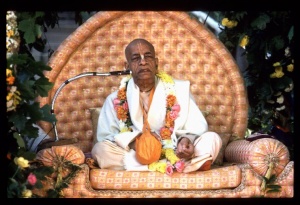SB 7.5.46: Difference between revisions
m (1 revision(s)) |
(Vanibot #0054 edit - transform synonyms into clickable links, which search similar occurrences) |
||
| (One intermediate revision by one other user not shown) | |||
| Line 1: | Line 1: | ||
{{info | {{info | ||
|speaker= | |speaker=Hiraṇyakaśipu | ||
|listener= | |listener=Hiraṇyakaśipu, thinking to himself | ||
}} | }} | ||
[[Category:Srimad-Bhagavatam - Canto 07 Chapter 05]] | |||
[[Category:Bhagavatam Verses Spoken by Hiranyakasipu - Vanisource|070546]] | |||
<div style="float:left">'''[[Srimad-Bhagavatam]] - [[SB 7|Seventh Canto]] - [[SB 7.5: Prahlada Maharaja, the Saintly Son of Hiranyakasipu|Chapter 5: Prahlāda Mahārāja, the Saintly Son of Hiraṇyakaśipu]]'''</div> | |||
<div style="float:right">[[File:Go-previous.png|link=SB 7.5.45]] '''[[SB 7.5.45]] - [[SB 7.5.47]]''' [[File:Go-next.png|link=SB 7.5.47]]</div> | |||
{{RandomImage}} | |||
==== TEXT 46 ==== | ==== TEXT 46 ==== | ||
<div | <div class="verse"> | ||
vartamāno 'vidūre vai | :vartamāno 'vidūre vai | ||
bālo 'py ajaḍa-dhīr ayam | :bālo 'py ajaḍa-dhīr ayam | ||
na vismarati me 'nāryaṁ | :na vismarati me 'nāryaṁ | ||
śunaḥ śepa iva prabhuḥ | :śunaḥ śepa iva prabhuḥ | ||
</div> | </div> | ||
| Line 17: | Line 22: | ||
==== SYNONYMS ==== | ==== SYNONYMS ==== | ||
<div | <div class="synonyms"> | ||
''[//vanipedia.org/wiki/Special:VaniSearch?s=vartamānaḥ&tab=syno_o&ds=1 vartamānaḥ]'' — being situated; ''[//vanipedia.org/wiki/Special:VaniSearch?s=avidūre&tab=syno_o&ds=1 avidūre]'' — not very far away; ''[//vanipedia.org/wiki/Special:VaniSearch?s=vai&tab=syno_o&ds=1 vai]'' — indeed; ''[//vanipedia.org/wiki/Special:VaniSearch?s=bālaḥ&tab=syno_o&ds=1 bālaḥ]'' — a mere child; ''[//vanipedia.org/wiki/Special:VaniSearch?s=api&tab=syno_o&ds=1 api]'' — although; ''[//vanipedia.org/wiki/Special:VaniSearch?s=ajaḍa&tab=syno_o&ds=1 ajaḍa]-[//vanipedia.org/wiki/Special:VaniSearch?s=dhīḥ&tab=syno_o&ds=1 dhīḥ]'' — complete fearlessness; ''[//vanipedia.org/wiki/Special:VaniSearch?s=ayam&tab=syno_o&ds=1 ayam]'' — this; ''[//vanipedia.org/wiki/Special:VaniSearch?s=na&tab=syno_o&ds=1 na]'' — not; ''[//vanipedia.org/wiki/Special:VaniSearch?s=vismarati&tab=syno_o&ds=1 vismarati]'' — forgets; ''[//vanipedia.org/wiki/Special:VaniSearch?s=me&tab=syno_o&ds=1 me]'' — my; ''[//vanipedia.org/wiki/Special:VaniSearch?s=anāryam&tab=syno_o&ds=1 anāryam]'' — misbehavior; ''[//vanipedia.org/wiki/Special:VaniSearch?s=śunaḥ&tab=syno_o&ds=1 śunaḥ] [//vanipedia.org/wiki/Special:VaniSearch?s=śepaḥ&tab=syno_o&ds=1 śepaḥ]'' — the curved tail of a dog; ''[//vanipedia.org/wiki/Special:VaniSearch?s=iva&tab=syno_o&ds=1 iva]'' — exactly like; ''[//vanipedia.org/wiki/Special:VaniSearch?s=prabhuḥ&tab=syno_o&ds=1 prabhuḥ]'' — being able or potent. | |||
</div> | </div> | ||
| Line 24: | Line 29: | ||
==== TRANSLATION ==== | ==== TRANSLATION ==== | ||
<div | <div class="translation"> | ||
Although he is very near to me and is merely a child, he is situated in complete fearlessness. He resembles a dog's curved tail, which can never be straightened, because he never forgets my misbehavior and his connection with his master, Lord Viṣṇu. | Although he is very near to me and is merely a child, he is situated in complete fearlessness. He resembles a dog's curved tail, which can never be straightened, because he never forgets my misbehavior and his connection with his master, Lord Viṣṇu. | ||
</div> | </div> | ||
| Line 31: | Line 36: | ||
==== PURPORT ==== | ==== PURPORT ==== | ||
<div | <div class="purport"> | ||
The word śunaḥ means "of a dog," and śepa means "tail." The example is ordinary. However one may try to straighten a dog's tail, it is never straight but always curved. Śunaḥ śepa is also the name of the second son of Ajīgarta. He was sold to Hariścandra, but he later took shelter of Viśvāmitra, Hariścandra's enemy, and never left his side. | The word ''śunaḥ'' means "of a dog," and ''śepa'' means "tail." The example is ordinary. However one may try to straighten a dog's tail, it is never straight but always curved. ''Śunaḥ śepa'' is also the name of the second son of Ajīgarta. He was sold to Hariścandra, but he later took shelter of Viśvāmitra, Hariścandra's enemy, and never left his side. | ||
</div> | </div> | ||
__NOTOC__ | |||
<div style="float:right; clear:both;">[[File:Go-previous.png|link=SB 7.5.45]] '''[[SB 7.5.45]] - [[SB 7.5.47]]''' [[File:Go-next.png|link=SB 7.5.47]]</div> | |||
__NOTOC__ | |||
__NOEDITSECTION__ | |||
Latest revision as of 23:03, 18 February 2024

A.C. Bhaktivedanta Swami Prabhupada
TEXT 46
- vartamāno 'vidūre vai
- bālo 'py ajaḍa-dhīr ayam
- na vismarati me 'nāryaṁ
- śunaḥ śepa iva prabhuḥ
SYNONYMS
vartamānaḥ — being situated; avidūre — not very far away; vai — indeed; bālaḥ — a mere child; api — although; ajaḍa-dhīḥ — complete fearlessness; ayam — this; na — not; vismarati — forgets; me — my; anāryam — misbehavior; śunaḥ śepaḥ — the curved tail of a dog; iva — exactly like; prabhuḥ — being able or potent.
TRANSLATION
Although he is very near to me and is merely a child, he is situated in complete fearlessness. He resembles a dog's curved tail, which can never be straightened, because he never forgets my misbehavior and his connection with his master, Lord Viṣṇu.
PURPORT
The word śunaḥ means "of a dog," and śepa means "tail." The example is ordinary. However one may try to straighten a dog's tail, it is never straight but always curved. Śunaḥ śepa is also the name of the second son of Ajīgarta. He was sold to Hariścandra, but he later took shelter of Viśvāmitra, Hariścandra's enemy, and never left his side.